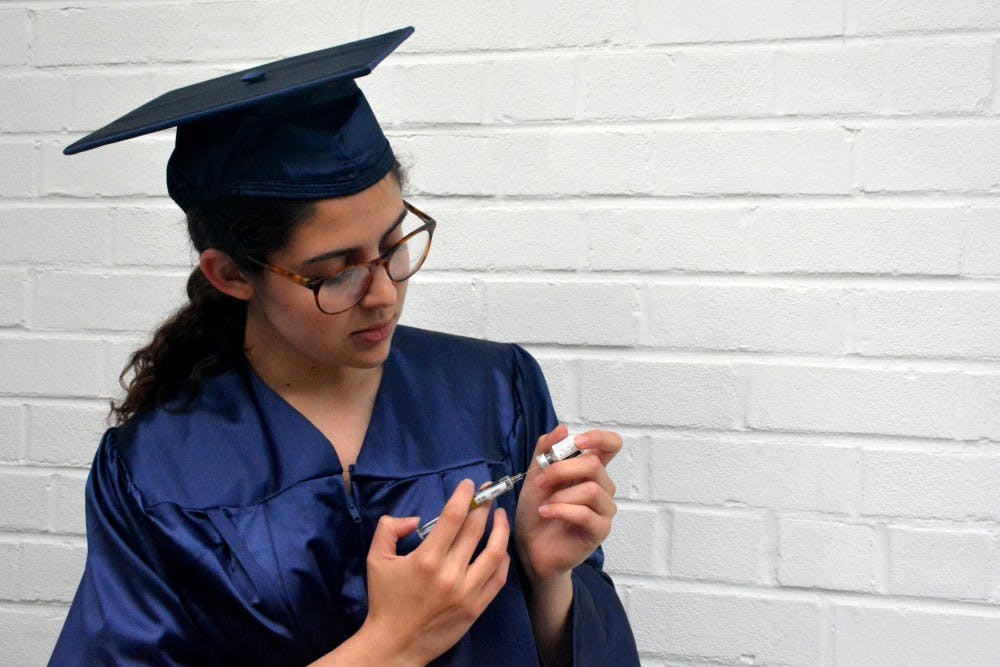As the 2018-2019 academic year comes to a close, fourth-year pre-med students Vikram Gupta and Grace Rovenolt are gearing up for their futures in medicine.
For those students seeking acceptance into medical school, undergraduate classes ranging from biology and chemistry, psychology and math are highly recommended. Not only do these classes show one’s scientific background, but also help prepare for the Medical College Admission Test. Rovenolt’s medical interests lie in neurology and emergency medicine, and she recalls how these standard classes have brought her to her closest friends at the University.
“I really like the camaraderie of pre-med and pre-health students,” Rovenolt said. “You have to jump through different classes or a certain amounts of shadowing hours and clinical hours, and we’re all kind of in it together, so you run into the same people over and over again.”
Due to the recurring encounters with fellow pre-health students, Rovenolt stresses the importance of creating a network of medical peers as soon as possible, whether that be nearby students or outside resources.
“Find a mentor or someone that you look up to, whether that's through peer counselors of the Career Center or maybe an older friend in your major,” Rovenolt said. “There is so much I've learned along the way … things that are kind of hard to get unless you have an inside scoop."
Though course requirements for medical school hold the opportunity for medical connections, their popularity brings on a necessity for self-advocacy. According to Gupta — whose focus is vascular surgery — the 300-person lectures fulfill requirements and teach needed information but also challenge students to go out of their way to make personal relationships with professors.
“You can't depend on [professors] to help you out as much,” Gupta said. “If someone doesn't have that intrinsic motivation to get that done, then they're going to have a tough time and they aren't going to be where they want to be when it's time to graduate or time to start applying to med school.”
Due to the extensive process of applying to medical school — consisting of interviews, essays and letters of recommendation — gap years are not uncommon amongst prospective applicants. According to the Association of American Medical Colleges, gap years are opportunities to strengthen GPA and MCAT scores, fulfill prerequisites and pay off loans, as well as shadow or volunteer within the field.
Gupta and Rovenolt have both decided to take gap years. Gupta’s work with a vascular surgery research lab at the University over the past four years has connected him with a partner lab in Germany where he will be spending the first three months of his gap year researching cardiovascular disease. Rosenolt has decided on a two-year gap, in which she will be conducting clinical research in the neurology department at the Yale New Haven Hospital located in Branford, Conn.
For both Gupta and Rovenolt, their involvements with groups outside of the classroom have been a big influence in their medical aspirations. From cognitive and vascular research labs to volunteering as EMTs with the local rescue squad, both students have found their respective niches amongst University Hospital’s community.
"One big plus to me of U.Va. is that we have the Health System right next door,” Gupta said. “If you really want to reach out and find things to do related to medicine and clinical practice, there is so much. Anything you could possibly want in medicine is right there."
Ultimately, Gupta and Rovenolt stress the importance of getting involved with hands-on medical work as quickly and early as possible.
“Just reach out and ask people if you can do things, you'd be surprised the responses you get,” Gupta said. “If you don't go looking for those opportunities you're not going to find them.”







